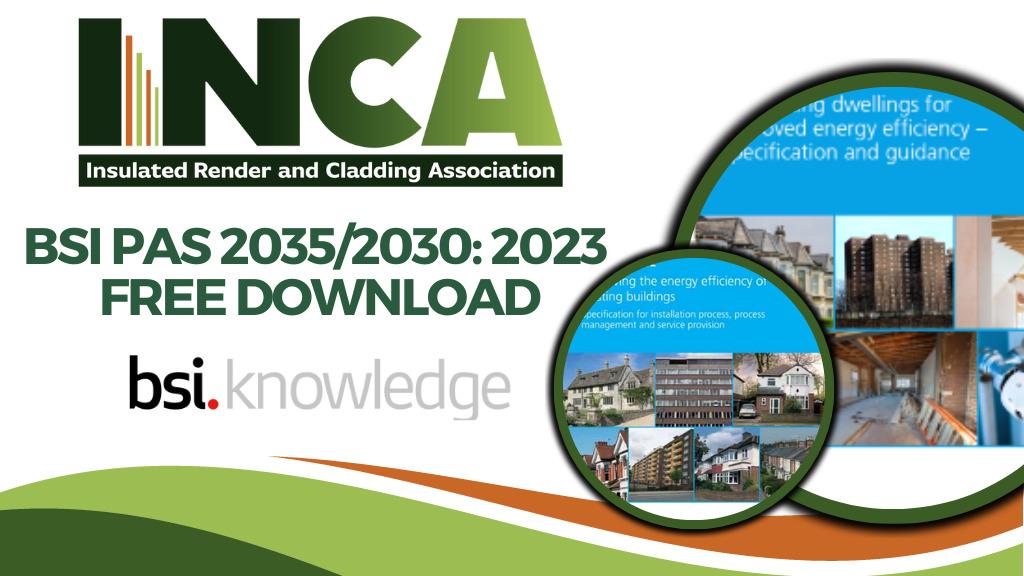
It’s just been announced that the British Standards Institute (BSI) have published the new Publicly Available Standards (PAS) 2035/2030:2023 and it’s now available to download for FREE at BSI’s webstore.
Download PAS 2035/2030:2023 >>>
PAS 2035 details best practice guidance for domestic retrofit projects, and specifies a process retrofit projects must follow which is based off a whole house approach as to minimise the risk of unintended consequences. PAS 2035 must be used in conjunction with the PAS 2030 document.
PAS 2030 on the other hand sets out robust and uniformly applicable technical specifications for the installation of energy efficiency improvement measures. The PAS 2030 document is used by installers of energy efficiency measures to ensure that they meet the requirements set out in the document, and to ensure that work carried out is to the highest standard.
Background to the revisions
Energy efficiency measures installed under current Government energy efficiency schemes must be compliant with PAS 2035/2030 to ensure installations are done to the highest quality and the risk of unintended consequences, such as condensation or damp, are minimised.
BSI’s revision of the PAS 2035/2030:2019+A1:2022 document was sponsored by the Department of Energy Security and Net Zero (DESNZ) to ensure the PAS 2035/2030 documents would reflect the most current industry best practice while enabling a safe, high-quality approach to domestic retrofit. These revisions are drafted by a technical author which sits within a wider industry-led steering group. This steering group is comprised of individual industry experts, each of which represents specific key areas within the energy efficiency and home retrofit industry.
The launch of the new PAS 2035/2030:2023 represents a significant milestone in government’s continued commitment to advancing industry standards and promoting quality assurance within the domestic energy efficiency sector.
What’s New?
PAS 2035/2030:2023 captures industry changes in the last year and reflects comments from the last revision. It incorporates views from a wide range of experts in the industry, as well as comments from BSI’s public consultation which ran from 28 March to 12 May 2023. PAS 2035/2030:2023 introduces several changes which are summarised start of the document.
It’s an incredibly important framework for anyone involved in the domestic retrofit market and needs to be studied in full and this latest revision aims to make it easier to do so:
It’s Freely Available: One of the most notable changes with this new release is that it is now freely available for download. The importance of making industry standards accessible to everyone is recognised, and this change ensures that PAS 2035/2030:2023 is within reach for all stakeholders and retrofit professionals.
It Minimises Risks and Ensures Quality: PAS 2035/2030:2023 has been reviewed so that it continues to ensure the highest quality in the industry. By following the guidelines outlined in this standard, you can enhance project outcomes, increase consumer confidence, and significantly reduce the risk of any unintended consequences to both the building and residents of dwellings.
It’s More user-friendly: In comparison to its predecessor, PAS 2035/2030:2023 specifies an approach to retrofit which is easier to understand and follow. The removal of risk pathways, as well as simplifying the language, makes the document more user-friendly, ensuring that compliance is more straightforward and efficient. Additional requirements and considerations for certain projects ensure continued assurance of quality.
Transition
Following discussions between DESNZ, BSI, the UK Accreditation Service (UKAS) and TrustMark, and consideration of industry’s comments to BSI’s public consultation on PAS 2035/2030:2023, there will be a transition period to allow time for industry to adopt changes to the PAS 2035/2030 documents.
This has been set for a period of 18 months, during which the PAS 2035/2030:2019+A1:2022 will remain available for use. This transition period will end on 30 March 2025, after which BSI will withdraw the PAS 2035/2030:2019+A1:2022 and retrofit projects must be carried out in accordance with PAS 2035/2030:2023.
This transition period has been set to allow:
- UKAS accredited PAS 2030 certification bodies to adopt PAS 2030:2023
- ·Installers to re-certify to PAS 2030:2023 certification for their relevant measures
- TrustMark Retrofit portal functionality changes to ensure work can be lodged in accordance with PAS 2035/2030:2023
- The amendment of PAS 2035/2030:2023 software solution tools
- Changes of business processes in organisations delivering retrofit under PAS 2035/2030:2023
- Upskilling of retrofit professionals
- Ample time for retrofit projects under government funded schemes (e.g. SHDF2.1, HUG2) to transition.
The ECO4 and Great British Insulation Schemes intend to consult on the cost implications of the PAS2035/2030:2023 update and on updating references to PAS 2035/2030:2019
in the ECO4 regulations in line with the transition arrangements.
Next Steps
Three things you should do right away:
- First and foremost you should download the PAS 2035/2030:2023 for free and understand the changes.
- Engage with your scheme provider and/or certification body to ensure you understand what you must do as an installer or organisation.
- Take action early to ensure there are no delays or delivery to retrofit in the future!
Download PAS 2035/2030:2023 >>>
FREE Webinar
The BSI have arranged a FREE Webinar to help you understand the changes.
At the event Dr Sarah Price technical author of PAS 2035/2030:2023, will run through the changes to the PAS. There will also be a slot where TrustMark will run through transitionary period arrangements, and a wider Q&A session. Date for this webinar: 24 October 2023 12:00-1:00pm (GMT)
Book your place: https://www.bsigroup.com/en-GB/our-services/events/webinars/2023/the-retrofit-standards-framework–webinar/
INCA will of course be at this event and will report back for the benefit of anyone unable to attend.
